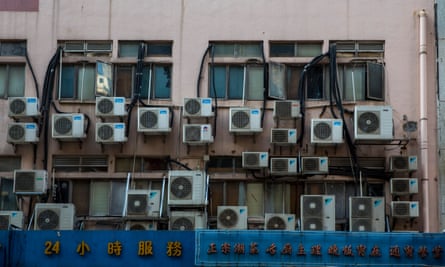https://www.theguardian.com/environment/2020/jul/17/air-conditioning-curbs-could-save-years-worth-of-emissions-study
Air conditioning curbs could save years' worth of emissions – study
UN and IEA call for stricter standards to improve energy efficiency and cut use of HFCs

Published onFri 17 Jul 2020 15.00 BST
Up to eight years’ worth of global greenhouse gas emissions could be prevented over the next four decades by setting tougher standards for air conditioning, according to a study.
It found that improving the energy efficiency of cooling systems by using climate-friendly refrigerants could remove emissions equivalent to between 210bn and 460bn tonnes of carbon dioxide by 2060.
The peer-reviewed analysis by the United Nations Environment Programme (Unep) and the International Energy Agency (IEA) found that cutting the use of climate-warming refrigerants such as hydrofluorocarbons (HFCs) alone could help avoid up to 0.4C of global warming by the end of the century.
Doubling the energy efficiency of air conditioning by 2050 would cut electricity use by 1,300 gigawatts, the equivalent of all the coal-fired power generation capacity in China and India in 2018, saving up to $2.9tn in electricity costs.
More efficient air conditioning would have other benefits too, according to the report, such as better access to life-saving cooling equipment for medicines and vaccines, improved air quality and reduced food loss and waste.
According to the report, an estimated 3.6bn cooling appliances are in use worldwide, and this could rise to 14bn by 2050 if cooling is provided to everybody who needs it rather than just those who can afford it.
Growing demand for cooling is contributing significantly to climate change by producing HFCs and carbon dioxide and often relying on electricity generated by fossil fuels. That demand is expected to grow faster in the years ahead in response to steadily rising global temperatures, creating a vicious circle of global heating.
Carbon emissions from the global energy industry in 2018 rose at the fastest rate in almost a decade, after extreme weather and surprise swings in global temperatures stoked the fastest increase in gas demand for 30 years.
The Unep/IEA report calls for action from governments to tackle the climate impacts of cooling as they roll out stimulus packages to deal with the economic and social impacts of the Covid-19 crisis.
It calls for all countries to adopt an amendment to the Montreal protocol, an international environmental treaty agreed in 2016 that calls for a drastic reduction in HFCs and was agreed in 2016.
Inger Andersen, Unep’s executive director, said climate-friendly cooling could help protect the natural environment and even reduce the risk of future pandemics while preventing runaway carbon emissions.
Dr Fatih Birol, the IEA’s executive director, said the Covid-19 pandemic offered governments “a unique opportunity to accelerate progress in efficient, climate-friendly cooling”, which he said was “one of the most effective tools governments have to meet energy and environmental objectives”.
He added: “By improving cooling efficiency, they can reduce the need for new power plants, cut emissions and save consumers money.”
We've never had a better chance ...
… to make a greener world. Covid-19 has delivered unusual environmental benefits: cleaner air, lower carbon emissions, a respite for wildlife. Now the big question is whether we can capitalise on this moment. The Guardian aims to lead the debate from the front.
In the weeks and months ahead, our journalism will investigate the prospects for a new green settlement. We will showcase the big thinkers and protagonists and amplify the arguments for authorities everywhere to consider as they lead us out of coronavirus.
Our credentials suit us well to the task: we are independent, we have no owners, no paymasters or oligarchs pulling the strings. We have committed to carbon neutrality by 2030, divested from the oil and gas sectors and renounced fossil fuel advertising. But at this crucial moment, news organisations like ours are facing a daunting financial challenge. As businesses everywhere feel the pinch, the advertising revenue that has long helped to sustain our work has plummeted. We need you to help fill the gap.
You’ve read
The Guardian believes that the climate crisis we face is systemic. We will inform our readers about threats to the environment based on scientific facts, not driven by commercial or political interests. We will keep reporting on the efforts of individuals and communities around the world who are fearlessly taking a stand for future generations and the preservation of human life on earth. We want their stories to inspire hope.
We need your support to keep delivering this kind of open, committed independent journalism. Every reader contribution, however big or small, is so valuable. Support the Guardian from as little as $1 – and it only takes a minute. Thank you.
沒有留言:
張貼留言